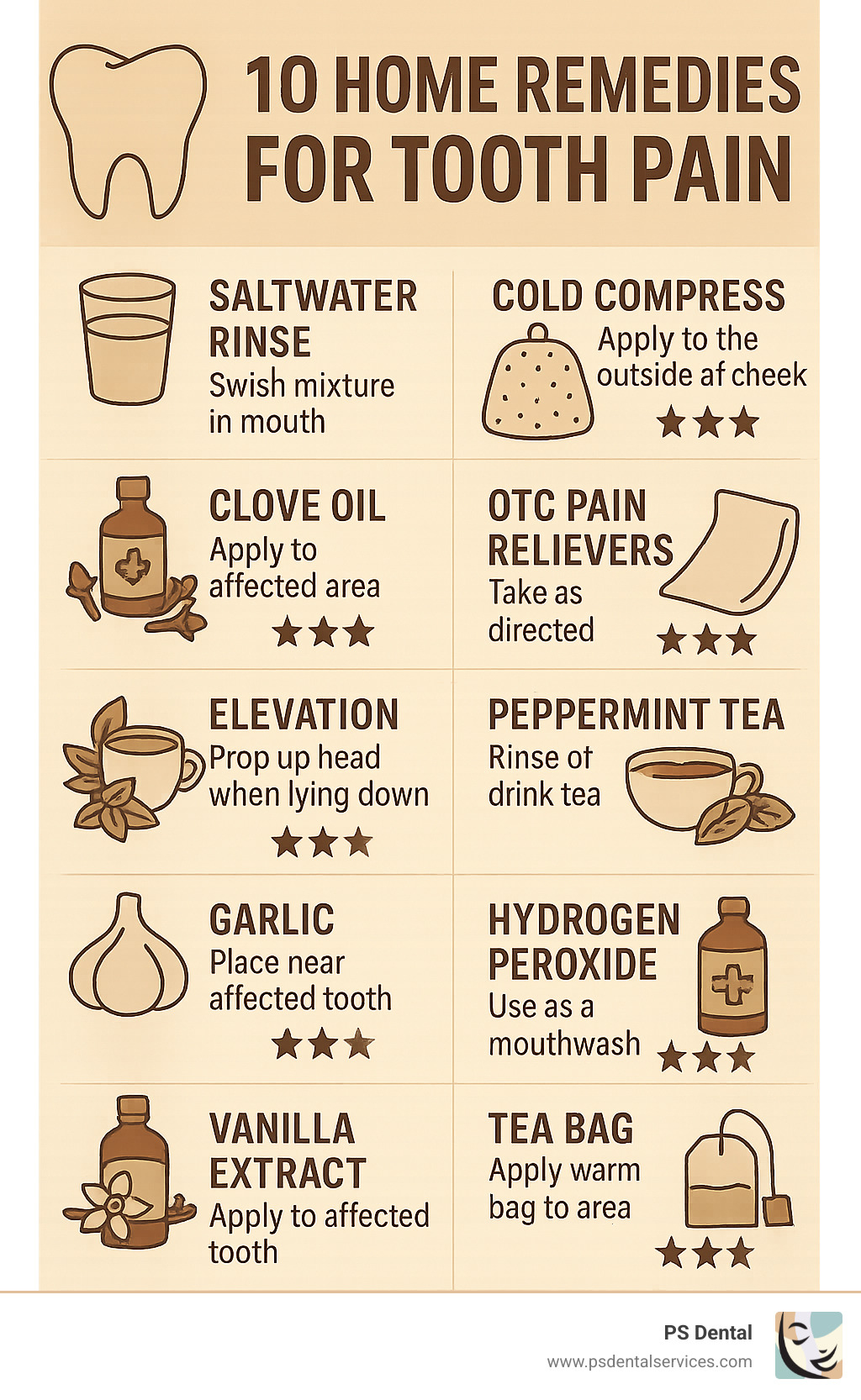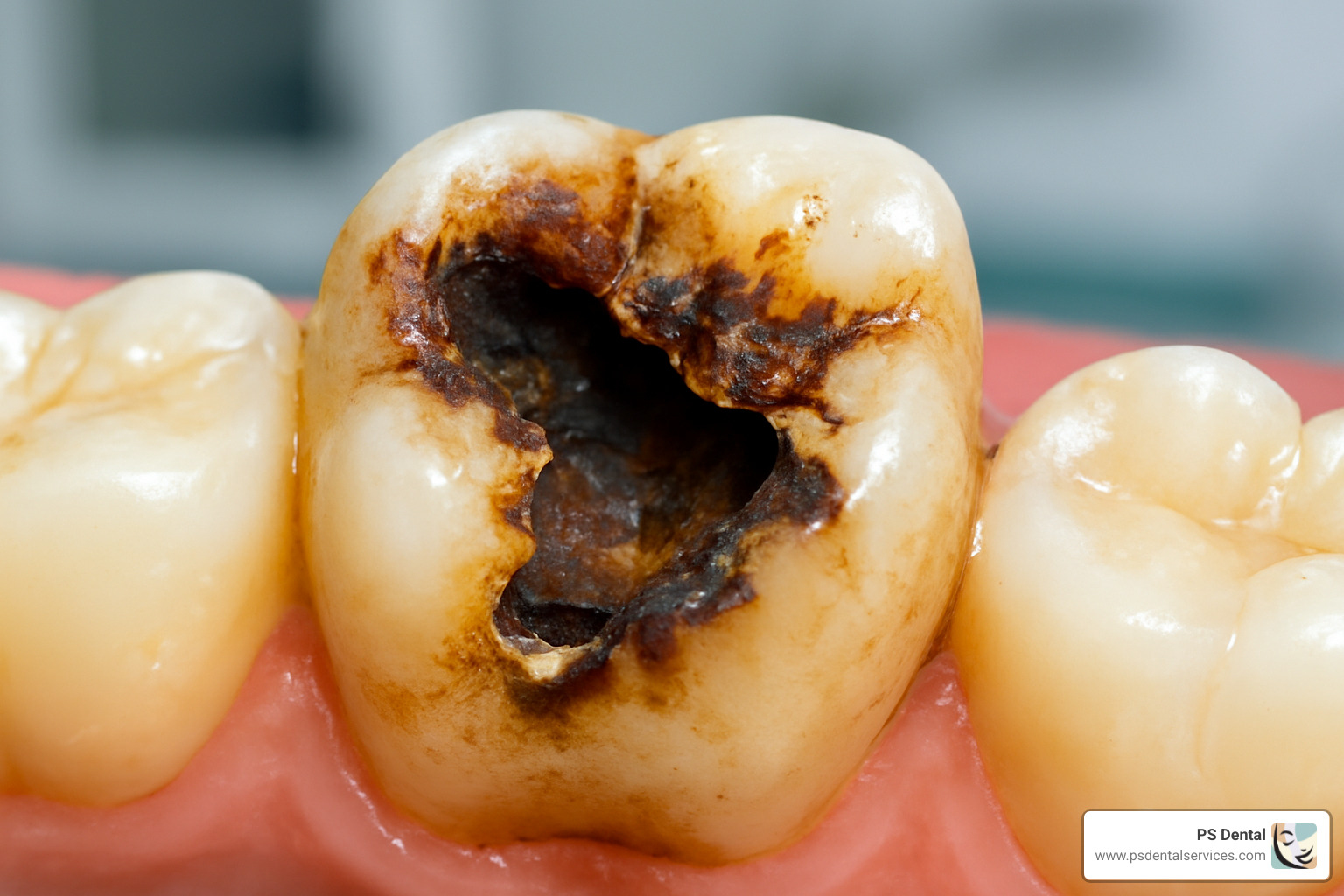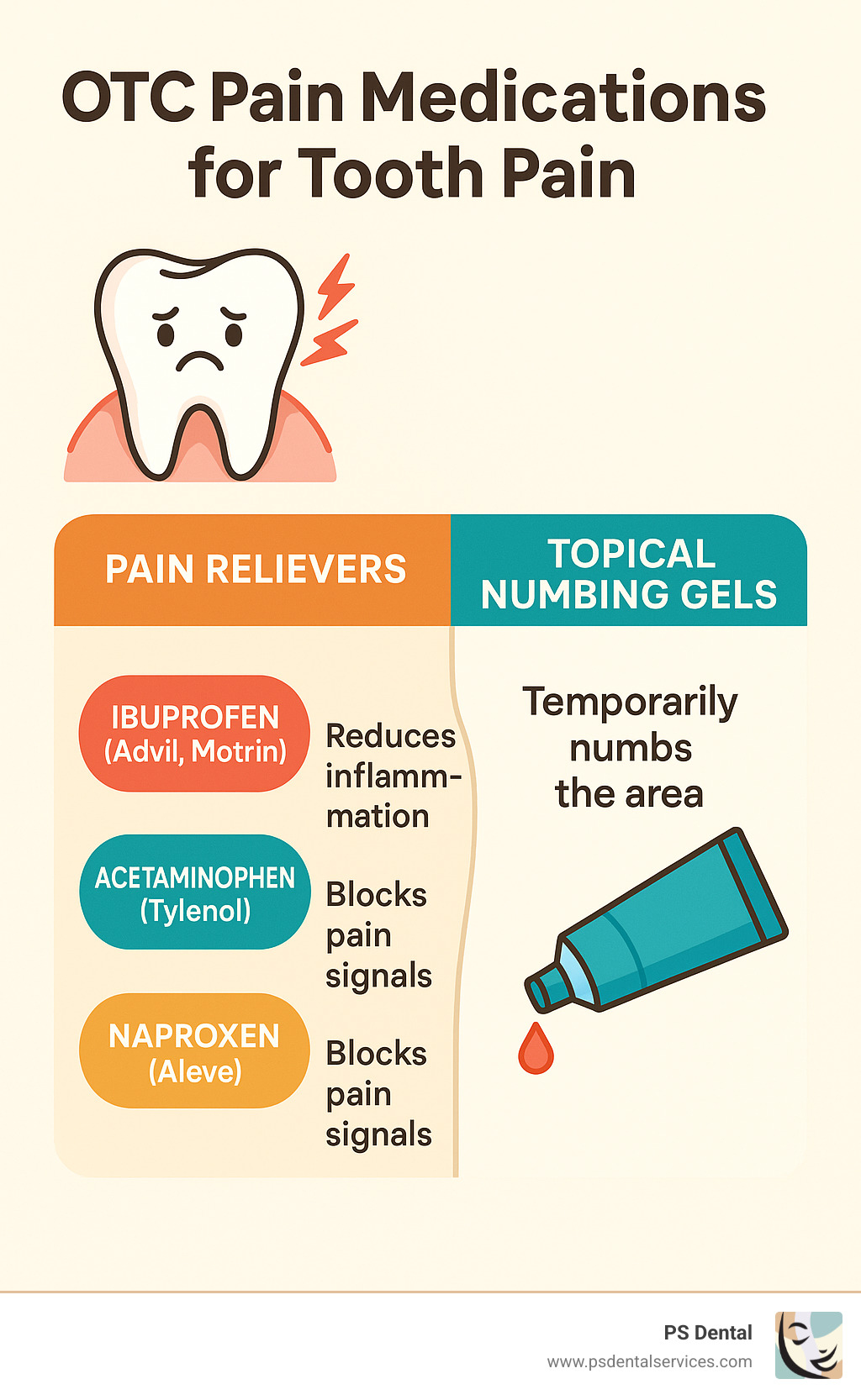The Agony of Tooth Decay: Finding Relief at Home
Home remedies for rotting tooth pain can provide temporary relief while you wait to see a dentist. Here are the most effective options:
- Saltwater rinse – Mix ½ teaspoon salt in warm water and swish for 30 seconds
- Cold compress – Apply to cheek for 15-20 minutes to reduce swelling
- Clove oil – Apply diluted oil (15 drops per ounce of carrier oil) to affected area
- Over-the-counter pain relievers – Ibuprofen or acetaminophen per package instructions
- Elevation – Keep your head liftd while sleeping to reduce blood flow and pain
A toothache can range from mild discomfort to excruciating pain that disrupts your entire day. When that pain comes from a rotting tooth, the intensity can be overwhelming. With 2.3 billion people worldwide suffering from tooth decay, you’re certainly not alone in seeking relief.
While home remedies can temporarily ease your suffering, they cannot cure the underlying issue. A rotting tooth requires professional dental care as soon as possible to prevent serious complications like infection spread, bone loss, and even systemic illness.
As Dr. Parisa Sepehri, I’ve spent over 30 years helping patients manage home remedies for rotting tooth pain while preparing them for proper dental treatment, ensuring they understand both immediate relief options and long-term solutions for their dental health.
Understanding Rotting Tooth Pain
That throbbing pain in your tooth isn’t just uncomfortable—it’s your body’s way of alerting you that something serious is happening. Before we explore relief options, let’s understand what’s actually going on when a tooth starts to rot.
What Causes Rotting Tooth Pain?
Think of your mouth as a battlefield where bacteria are constantly at work. When these tiny troublemakers feed on sugars and starches in your food, they produce acids that slowly eat away at your tooth enamel—the hard protective outer layer. Over time, this creates cavities (small holes) that can penetrate deeper into your tooth.
As decay progresses, it can reach the dental pulp—the sensitive inner tissue containing nerves and blood vessels. This triggers inflammation (pulpitis) and that’s when the real pain begins. If left untreated, the infection can form a pocket of pus called an abscess, which cranks up the pain to another level entirely.
Sometimes the culprit isn’t a new cavity but damaged dental work. Cracked fillings or worn dental restorations can suddenly expose vulnerable parts of your tooth to bacteria and temperature changes. Receding gums can also leave tooth roots exposed, creating another pathway for sensitivity and decay.
Signs and Symptoms of a Rotting Tooth
Your body sends clear signals when tooth decay reaches a painful stage:
- A persistent ache or throbbing that won’t quit
- Sharp, shooting pain when you bite down
- Wincing when consuming hot, cold, or sweet foods
- Visible holes or dark spots on your teeth
- Swollen, tender gums around the affected tooth
- Bad breath that brushing doesn’t fix
- Unpleasant taste that lingers in your mouth
- Facial swelling (a sign that infection is spreading)
- Fever (indicating your body is fighting infection)
When to Call a Dentist Immediately
While the home remedies for rotting tooth pain we’ll discuss can provide temporary comfort, certain warning signs mean you shouldn’t wait for relief—you need professional help right away:
Don’t delay if you experience: severe pain that over-the-counter medications can’t touch, swelling that extends to your face or neck, fever alongside tooth pain, difficulty breathing or swallowing, persistent bleeding, or a severely damaged tooth.
At PS Dental Services in Tigard, we understand dental emergencies rarely happen at convenient times. If you’re experiencing any of these symptoms, please contact our office immediately—your health is our priority.
Risks of Delaying Treatment
I’ve seen it too many times—patients hoping the pain will just go away on its own. Unfortunately, untreated tooth decay only gets worse, and the consequences can be serious:
Infection spread: Bacteria don’t stay put. They can travel through your bloodstream to other parts of your body, including vital organs.
Bone loss: The infection can damage the bone supporting your teeth, potentially leading to tooth loss and more complex dental problems.
Sepsis: In severe cases, dental infections can lead to sepsis, a life-threatening condition where infection overwhelms your entire body.
A simple cavity that might have been fixed with a small filling can quickly escalate to needing root canal therapy, extraction, or even hospitalization. Research published in the Journal of Endodontics confirms that delayed treatment significantly increases both treatment complexity and costs.
While home remedies for rotting tooth pain can help you manage discomfort temporarily, they’re just a bridge to proper dental care. For more information about preventing these situations, check out our guide on Ways to Prevent Tooth Decay.
Home Remedies for Rotting Tooth Pain – Quick Relief List
When tooth pain strikes and you can’t get to the dentist right away, home remedies for rotting tooth pain can be a real lifesaver. While these solutions won’t cure the underlying problem, they can help you manage the discomfort until you can get proper dental care.
Fast-Acting Home Remedies for Rotting Tooth Pain
A saltwater rinse is often your best first line of defense against tooth pain. It’s simple, safe, and surprisingly effective. Mix half a teaspoon of table salt in a glass of warm water (not hot—that could make your pain worse!), then swish it around your mouth for about 30 seconds before spitting it out. The salt acts as a natural disinfectant and can help draw out some of the fluid causing swelling. According to research published in PLOS ONE, saltwater actually promotes cell migration, which helps with healing. You can safely repeat this 4-5 times throughout the day.
Hydrogen peroxide can also help when diluted properly. Create a 1:1 mixture of 3% hydrogen peroxide and water, swish for 30 seconds, then spit it out completely. Always rinse with plain water afterward. The antibacterial properties help reduce plaque and harmful bacteria, but never use it undiluted—it can damage your oral tissues.
For external relief, nothing beats a good cold compress. Simply wrap some ice in a thin towel (never apply ice directly to your skin) and hold it against your cheek near the painful tooth for 15-20 minutes. Take a break for at least 15 minutes before reapplying. The cold constricts your blood vessels, which reduces inflammation and naturally numbs the area.
If your tooth pain tends to worsen at night, try elevation. When you lie flat, blood flows more readily to your head, increasing pressure on already inflamed areas. Using an extra pillow or two to keep your head liftd can make a surprising difference in your comfort level. For consistent elevation, a wedge pillow works wonders.
Sometimes, pain can be worsened by food particles trapped around a decaying tooth. Gentle flossing around the painful area might provide immediate relief by removing debris. If traditional flossing hurts too much, try a water flosser on a low setting, or tie a small knot in your floss to better capture stubborn particles.
Kitchen & Garden Helpers for Rotting Tooth Pain
Your kitchen and garden might hold some surprisingly effective pain relievers. Clove oil contains eugenol, a natural anesthetic that studies have shown to be as effective as benzocaine for tooth pain. To use it safely, dilute 15 drops in an ounce of carrier oil like olive or coconut oil, apply to a cotton ball, and hold against the painful area for 5-10 minutes. No clove oil? A whole clove works too—just gently chew it to release the oils, then hold it against the painful spot.
Garlic, with its antibacterial allicin, can fight pain and the bacteria causing decay. Crush a fresh clove into a paste (add a pinch of salt if you like), apply directly to the affected area, and leave it for a few minutes before rinsing. Fair warning: while effective, the taste and smell might not be for everyone!
For a gentler approach, try peppermint tea. The menthol in peppermint provides mild numbing and antibacterial benefits. Steep a tea bag, let it cool slightly, then apply it directly to the sore tooth. You can even chill the used tea bag in the fridge for extra cooling relief. Alternatively, swishing with cooled peppermint tea can help reach all areas of pain.
Pure vanilla extract (not the artificial kind) contains alcohol that can help numb pain, while vanilla itself offers antioxidant properties. Just apply a few drops to a cotton ball and hold it against the painful area for a few minutes, repeating as needed.
If you have access to guava leaves, their anti-inflammatory and antimicrobial properties make them excellent for tooth pain. You can either chew fresh, clean leaves slowly, directing the juice toward the painful area, or boil 4-5 leaves in water, cool the liquid, and use it as a mouthwash.
Wheatgrass juice, rich in antibacterial chlorophyll, makes an effective mouthwash when swished for 30 seconds several times daily. Similarly, thyme essential oil has powerful antibacterial properties—just dilute a few drops in carrier oil and apply with a cotton ball, or add a drop to water for a therapeutic rinse.
OTC Meds & Numbing Gels
Over-the-counter medications can provide significant relief when used properly. Ibuprofen (Advil, Motrin) reduces inflammation while blocking pain signals, acetaminophen (Tylenol) blocks pain signals without affecting inflammation, and naproxen (Aleve) offers longer-lasting relief. Recent research even suggests that combining ibuprofen and acetaminophen can be as effective as prescription opioids for dental pain. Always follow package directions and check with your healthcare provider if you have medical conditions or take other medications.
For direct application, topical numbing gels containing benzocaine temporarily numb the painful area. Apply a small amount directly to the affected spot and reapply according to package instructions (typically every 1-2 hours). Be aware that benzocaine carries a rare risk of methemoglobinemia, a serious condition that reduces the blood’s ability to carry oxygen, so use with caution, especially with children.
While these home remedies for rotting tooth pain can provide temporary relief, they’re just holding measures until you can see us at PS Dental. A rotting tooth needs professional treatment to prevent serious complications. Learn more about Ways to Prevent Tooth Decay to avoid future painful episodes.
Remedies to Skip or Use With Caution
When you’re in pain, it’s tempting to try anything for relief. But not all home remedies are created equal, and some could actually make your situation worse. As a dental professional who’s seen the aftermath of well-intentioned but harmful home treatments, I want to guide you away from potentially dangerous options.
Potentially Harmful Remedies
That bottle of household bleach? Please keep it far away from your mouth! Despite what you might read in some corners of the internet, bleach and other household cleaners can cause severe tissue damage and chemical burns. This isn’t just uncomfortable—it can create an entirely new emergency on top of your tooth pain.
Undiluted hydrogen peroxide is another common mistake I see patients make. While diluted hydrogen peroxide can help (as mentioned earlier), using it at full strength can damage your gum tissue and erode tooth enamel, making your problems worse in the long run.
Many people believe placing an aspirin directly on their aching gum will target the pain better. Unfortunately, this aspirin-on-gum technique actually causes chemical burns to your soft tissue, creating a painful ulcer that adds to your misery.
Alcohol gargles might seem like they’d kill bacteria (after all, we use alcohol as a disinfectant), but they’re surprisingly ineffective against the specific bacteria causing your tooth problems. Plus, they dry and irritate your mouth tissues, potentially delaying healing.
I’ve had patients ask about colloidal silver after reading about it online. The truth? There’s no scientific evidence supporting its benefits for dental issues, and it carries the risk of permanently turning your skin bluish-gray (a condition called argyria)—definitely not the look most people are going for!
While oil pulling in moderation can be fine, extended oil pulling beyond 20 minutes offers no additional benefits and can waste valuable time when you should be seeking proper treatment for a rotting tooth.
Special Considerations for Children and Pregnant Women
When it comes to our little ones and expectant mothers, extra caution is essential.
For children with tooth pain:
* Avoid benzocaine products in children under 2 years old, as they’ve been linked to a rare but serious condition affecting oxygen levels in the blood
* Always use age-appropriate doses of pain relievers, carefully following package instructions or pediatrician recommendations
* Stick with saltwater rinses and cold compresses as the safest options for temporary relief
* Never give aspirin to children or teenagers due to the risk of Reye’s syndrome, a rare but serious condition
If you’re pregnant and experiencing tooth pain:
* Consult with your healthcare provider before taking any medication, even over-the-counter options
* Use essential oils with caution during pregnancy, as some may not be recommended
* Saltwater rinses and cold compresses remain the safest first-line options that won’t potentially affect your baby
At PS Dental Services, we understand how desperate tooth pain can make you feel. While you’re waiting for your appointment with us, stick with the safer remedies we’ve outlined earlier, and remember—we’re just a phone call away if you need guidance on managing your discomfort safely.
Long-Term Defense: Prevention & Lifestyle Upgrades
While home remedies for rotting tooth pain can offer temporary relief, nothing beats preventing tooth decay in the first place. Think of your dental health as a long-term investment that pays dividends in comfort, confidence, and overall wellness.
Daily Oral Hygiene
Your daily routine forms the foundation of tooth decay prevention. Brushing twice daily with fluoride toothpaste isn’t just good advice—it’s your teeth’s best defense against decay. Make sure you’re spending a full two minutes each time, paying special attention to the gumline where bacteria love to hide.
Flossing might feel like a chore, but it reaches nearly 40% of your tooth surfaces that brushing alone misses. Just once a day is enough to make a significant difference in preventing cavities between teeth.
Don’t forget about your tongue! It can harbor bacteria that contribute to both bad breath and tooth decay. A quick scrub with your toothbrush or a dedicated tongue scraper takes just seconds but adds another layer of protection.
Dietary Choices
What you eat matters as much as how you clean. Every time you sip that soda or enjoy a sugary treat, bacteria in your mouth throw a party, producing acids that attack your enamel for up to 20 minutes afterward. I’m not suggesting you never enjoy sweets—just be mindful of frequency rather than amount.
Tooth-friendly foods can actually help protect your smile. Cheese, yogurt, and other dairy products provide calcium and phosphates that remineralize enamel. Crunchy fruits and vegetables like apples and celery act as natural toothbrushes, stimulating saliva that washes away food particles.
Water deserves special mention as your mouth’s best friend. It rinses away food debris, dilutes acids, and prevents dry mouth—a major risk factor for decay. Try to make it your beverage of choice, especially between meals.
Professional Care
Even the most diligent home care needs professional backup. At PS Dental Services, we recommend checkups every six months to catch problems early when they’re smaller, less painful, and less expensive to fix.
Consider dental sealants for those deep grooves in back teeth where decay often starts. These thin protective coatings act like raincoats for your molars, keeping food and bacteria out of hard-to-clean crevices. They’re especially valuable for children but benefit adults too.
If you grind your teeth at night (and many people do without realizing it), a custom night guard can prevent the kind of enamel damage that makes teeth more vulnerable to decay. Similarly, if you play sports, a properly fitted mouthguard protects your dental investment from traumatic injury.
Professional fluoride treatments provide another layer of protection, especially if you’re at higher risk for cavities. These concentrated applications strengthen enamel significantly more than toothpaste alone can achieve.
Lifestyle Factors
Some lifestyle choices have outsized impacts on your dental health. Tobacco use, whether smoking or chewing, dramatically increases your risk of both gum disease and tooth decay. If you need help quitting, we’re happy to connect you with resources.
Excessive alcohol consumption not only stains teeth but can lead to dry mouth, reducing the protective benefits of saliva. If you drink, do so in moderation and remember to stay hydrated.
Speaking of dry mouth, many medications list it as a side effect. If you notice increased thirst or difficulty swallowing, talk to both your physician and dentist about management strategies. Sometimes a simple switch in medication timing or formulation makes all the difference.
Acid reflux deserves attention too, as stomach acid can silently erode enamel over time. If you experience heartburn regularly, addressing the underlying issue protects both your digestive system and your smile.
At PS Dental Services in Tigard, Oregon, Dr. Sepehri and our team offer comprehensive preventive care, including same-day crowns (CEREC), tooth-colored fillings, and other treatments designed to stop decay before pain ever starts. For more information about preventing tooth decay, visit our Tooth Decay Prevention page.
Frequently Asked Questions about Home Remedies for Rotting Tooth Pain
Can home remedies actually cure a rotting tooth?
The short answer? No, home remedies cannot cure a rotting tooth. While these remedies can be lifesavers when you’re in pain at 2 AM, they’re like putting a bandage on a broken bone – they provide temporary comfort but don’t fix the underlying problem.
Tooth decay is progressive, meaning it keeps getting worse until properly treated. Think of it as a leaky roof – patching it with duct tape might help temporarily, but eventually, you need a roofer to fix it properly.
Professional treatment is always necessary and might include:
* A filling to remove decay and restore your tooth
* Root canal therapy if infection has reached the inner pulp
* A crown to protect weakened tooth structure
* Extraction as a last resort if the tooth cannot be saved
At PS Dental Services, we focus on preserving your natural teeth whenever possible. Our same-day crown technology even allows us to complete many restorations in just one visit, getting you back to your life with minimal disruption.
Which remedy is safest for kids or during pregnancy?
When it comes to our littlest patients and expectant mothers, safety comes first. The gentlest home remedies for rotting tooth pain for these special groups are:
Saltwater rinses are generally safe for children old enough to rinse and spit (usually around age 6 and up) and are perfectly fine during pregnancy. This simple solution cleanses without harsh chemicals.
Cold compresses applied to the outside of the cheek are safe for everyone – from toddlers to grandparents and expectant mothers. They reduce swelling and provide numbing relief without any internal medications.
Over-the-counter pain relievers can help, but always check with your pediatrician or obstetrician first. Dosages and recommendations vary widely based on age, weight, and pregnancy status.
For children under 6, always supervise any remedy to prevent accidental swallowing. And if you’re pregnant, it’s best to avoid essential oils unless specifically approved by your healthcare provider.
Our team at PS Dental Services provides gentle, compassionate care for your entire family. We understand the unique needs of children and expectant mothers and can provide personalized guidance for your situation.
What should I do if I have swelling, fever, or trouble swallowing?
If you’re experiencing facial swelling, fever, or difficulty swallowing, this isn’t just a toothache – it’s a potential emergency. These symptoms signal that infection may be spreading beyond the tooth, and this requires immediate medical attention.
Think of these as your body’s red alert signals. When infection from a tooth spreads into surrounding tissues or your bloodstream, it can become life-threatening surprisingly quickly.
If you notice:
* Swelling in your face, jaw, or neck
* Fever over 101°F (38.3°C)
* Trouble swallowing or breathing
* Pain so severe that over-the-counter medications don’t touch it
Take these steps right away:
1. Call our Tigard office immediately
2. If it’s after hours, follow our emergency contact procedures
3. If you can’t reach us and symptoms are severe, don’t wait – go to an emergency room
4. Never adopt a “wait and see” approach with these symptoms
I’ve seen patients who delayed treatment for what seemed like “just a bad toothache” end up hospitalized with serious infections. Dental infections can spread rapidly through the soft tissues of your face and neck, potentially blocking airways or entering your bloodstream.
At PS Dental Services, we take dental emergencies seriously and will make every effort to see you promptly when these concerning symptoms arise. Your health and safety are our top priorities.
Conclusion
While home remedies for rotting tooth pain can provide valuable temporary relief, they’re never a substitute for professional dental care. Think of these remedies as your first aid kit—helpful in the moment, but not the cure. A rotting tooth indicates active decay that will continue to worsen without proper treatment.
At PS Dental Services in Tigard, Oregon, Dr. Parisa Sepehri and our friendly team understand how debilitating tooth pain can be. We’ve seen how that throbbing ache can disrupt sleep, work, and even simple pleasures like enjoying a meal. That’s why we’re committed to seeing emergency cases promptly—because we know what you’re going through.
Our comprehensive approach to dental care addresses tooth decay at any stage. From preventive services to catch problems early, to restorative treatments like same-day crowns, tooth-colored fillings, and gentle root canal therapy, we provide solutions custom to your specific needs. Many patients are pleasantly surprised to find that addressing dental problems is far less uncomfortable than they feared—especially compared to the pain they’ve been enduring!
While you’re waiting for your appointment, the home remedies we’ve discussed can help manage your discomfort. That saltwater rinse or cold compress might just help you get through the night more comfortably. But remember—these are temporary measures, not solutions.
Your best defense against tooth pain will always be prevention. Regular checkups allow us to catch small problems before they become painful emergencies. Good home care creates a foundation for lasting dental health. And lifestyle choices that support your teeth—like staying hydrated and limiting sugary snacks—can help you avoid the agony of tooth decay altogether.
Don’t let tooth pain control your life any longer. The relief you’re seeking is just a phone call away. Contact PS Dental Services today to schedule an appointment and take the first step toward a healthier, pain-free smile.
More info about dental treatments
Dr. Parisa Sepehri
Latest posts by Dr. Parisa Sepehri (see all)
- Transform Your Smile: The Top Benefits of a Hollywood Smile Makeover - September 14, 2025
- Unlocking the Power of Oral Appliance Therapy: A CPAP Alternative for Obstructive Sleep Apnea - September 13, 2025
- Unlocking the Benefits of Inpatient Dental Care: Special Needs Dentistry, Hospital Dentistry, and More! - September 12, 2025
- Revolutionizing Tooth Restoration: The Power of CEREC Crowns in Digital Dentistry - September 11, 2025
- Unlock the Power of Prevention: The Benefits of Early Detection Through Tooth Cleaning with Your Family Dentist - September 10, 2025











